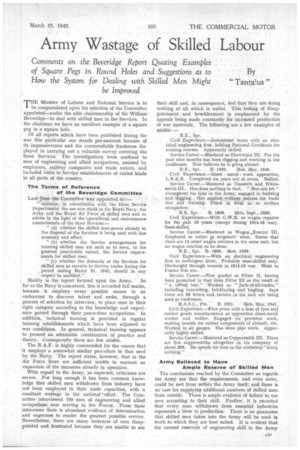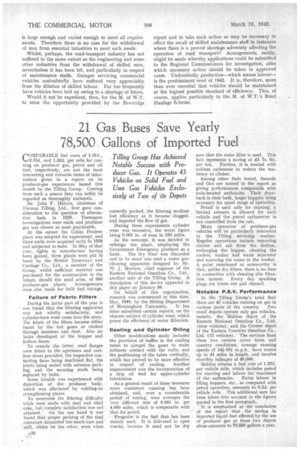Army Wastage of Skilled Labour
Page 33

Page 34

If you've noticed an error in this article please click here to report it so we can fix it.
Comments on the Beveridge Report Quoting Examples of Square Pegs in Round Holes and Suggestions as to By How the System for Dealing with Skilled Men Might " Tanta!us " be Improved
THE Minister of Labour and National Service is to I be congratulated upon his selection of the Committee appointed—under the able chairmanship of Sir William Beveridge--to deal with skilled men in the Services. In the chairman we have an excellent example of a square peg in a square hole.
Of all reports which have been published during the war this particular one stands pre-eminent because of its impressiveness and the commendable frankness displayed in carrying out a valuable survey covering the three Services. The investigations were confined to men of engineering and allied occupations, assisted by employers, railway companies and trade unions, and included visits to Service establishments of varied kinds in all parts of the country.
The Terms of Reference
of the Beveridge Committee Last June the Committee was appointed to :- " examine, in consultation with the three Service Departments, the use now made in the Royal Navy, the Army and the Royal Air. Force of skilled men and to advise in the light of the operational and maintenance commitments of the three Services:—
" (a) whether the skilled man-power already at the disposal of the Services is being used with due economy and effect; " (b) whether the Service arrangements for training skilled men are such as to meet, to the greatest practicable extent, the Service requirements for skilled men; " (c) whether the demands of the Services for skilled men as recruits to Service trades during the period ending March 31, 1942, should in any respect be modified."
Mainly is the report focused upon the Army. So far as the Navy is concerned, this is accorded full marks, because it employs every possible means in an endeavour to discover talent and seeks, through a process of selection by interview, to place men in their right category according to the knowledge and experience gained through their peace-time occupations. In addition, technical training is provided in regular training establishments which have been adjusted to war conditions. In general, technical training appears to present an admirable combination of practice and theory. Consequently there are few misfits.
The R.A.F. is highly commended for the reason that it employs a somewhat similar procedure to that used by the Navy. The report states, however, that in the Air Force there are .sufficient misfits to warrant an expansion of the measures already in operation.
With regard to the Army, as expected, criticisms are severe. For long enough it has been common knowledge that skilled men withdrawn from industry have not been employed in their trade capacities, with a resultant wastage in the national 'effort. The Committee interviewed 169 men of engineering and allied occupations now sewing in the Forces, From these interviews there is abundant evidence of determination and eagerness to render the greatest possible service. Nevertheless, there are many instances of men disappointed and frustrated because they are unable to use their skill and, in consequence, feel that they are doing nothing at all which is useful. This feeling of disappointment and bewilderment is emphasized by the appeals being made constantly for increased production of war materials. The following are a few examples of misfits:—
IRE., Spr.
Civil Experience.—Instrument tester with an electrical engineering firm, holding National Certificate for evening courses. Apparently skilled.
Service Career.—Mustered as Electrician III. For the past nine months has been digging and working in the cookhouse. Now believes he is going abroad.
RE., Spr. B. 1920. Mob. May, 1940.
Civil Experience.—Sheet metal-work apprentice, L.N.E.R. Completed six years out of seven. Skilled.
Service Career.—Mustered as Tinsmith and Whitesmith. III. Has done nothing in that. "Not one bit" throughout his time in the Army; engaged in building and digging. Has applied without success for trade test and training. Filled in form as to civilian occupation.
R.E. Spr. B. 1898. Mob. Sept., 1939.
Civil Experience.—With G.W.R. as wagon repairer for the past 20 years (except during 1914-18 war). Semi-skilled.
Service Career.—Mustered as Wagon ,Erector III. Employed as waiter in sergeants' mess. States that there are 14 other wagon erectors in the same unit, but no wagon erection to be done.
RE., Spr. B. 1895. Mob. 1939, •
Civil Experience.—With an electrical engineering firm as switchgear fitter. Probably semi-skilled only. Discharged through wounds in 1914-18 war. Went to France this war.
Service Career.—Now graded as Fitter II, having been promoted to that from Fitter III as the result of " a verbal test." Worked as " Jack-of-all-trades," including 'concreting, bricklaying and bugling. Says there are 50 fitters and turners in ‘his unit not being used as tradesmen. R.A.S.C., Pte. B. 1921. Mob. May, 1941.
Civil Experience.—Five years with a firm of tyre and rubber goods manufacturers as apprentice sheet-metal worker and welder. Engaged on precision work, making moulds for rubber components of aircraft, etc. Worked to all gauges. Has done pipe work. Apparently highly skilled.
Service Career.—Mustered as Coppersmith III. There are five coppersmiths altogether in his company of about 200. He spends his time in the workshop -doing nothing."
Army Believed to Have Ample Reserve of Skilled Men
The conclusions reached by the Committee as regards the Army are that the requirements, and even more, could be met from within. the Army itself; and there is no case for supplying additional numbers of skilled men from outside. There is ample evidence of failure to use men according to their skill. Further, it is recorded that every man withdrawn from essential industries represents a blow to production. There is no guarantee that skilled men taken into the Army will be used in work to which they are best suited. It is evident that the unused reservoir of engineering skill in the Army is large enough and varied enough to meet all requirements. Therefore there is no case for the withdrawal of men from essential industries to meet such needs.
Whilst, perhaps, the road-transport industry has not suffered to the same extent as the engineering and some other industries from the withdrawal of skilled men, nevertheless it has been hit, and particularly in respect of maintenance staffs. Garages servicing commercial vehicles undoubtedly have suffered very appreciably from the dilution of skilled labour. Far too frequently have vehicles been laid up owing to a shortage of fitters.
Would it not be expedient, then, for the M. of W.T. to seize the opportunity provided by the Beveridge report and to take such action as may be necessary to effect the recall of skilled maintenance staff in instances where there is a proved shortage adversely affecting the operation of road transport? Arrangements, surely, might be made whereby applications could be submitted to the Regional Commissioners for investigation, after which necessary action should be taken in approved cases. Undoubtedly production—which means labour— is the predominant need of 1942. It is,. therefore, /pore than ever essential that vehicles should be maintained at the highest possible standard of efficiency. This, of course, applies particularly to the M. of W.T.'S Road Haulage Scheme.




















































